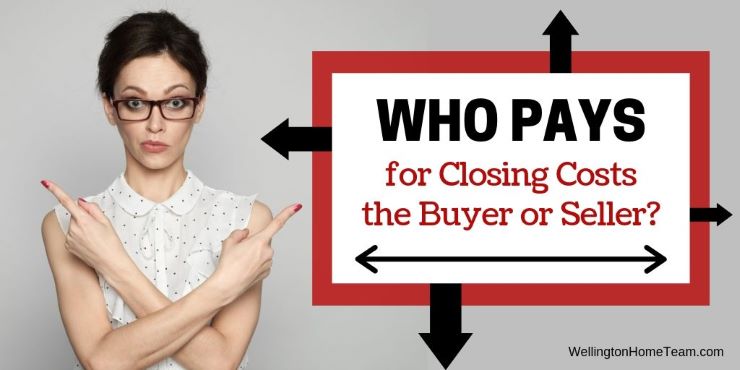Who Pays for Closing Costs, the Buyer or Seller?
If you’re buying or selling real estate you may be wondering who pays for closing costs, is it the buyer or seller? The answer is both, the buyer has their own closing costs and so does the seller. It’s not customary for a seller to ask the buyer to pay for any of their closing costs. However, some home buyers will ask the seller to pay for some or all of their closing costs.

When a buyer makes this type of request it’s typically referred to as a seller concession or seller contribution. However, not all sellers will agree to pay a penny toward a buyer’s closing costs. Plus, lenders may have restrictions on seller contributions. Therefore a buyer should never assume they won’t have to pay for any of their own closing costs.
This is one of the many reasons why buyers and sellers should know their closing costs upfront. That is before they even commit to buying or selling a home. A buyer should never find the perfect home only to find out they don’t have enough money for closing costs. And a seller should never list their home only to find out they’d have to bring money to closing.
Closing Costs for Home Buyers
Wondering what does the buyer pay at closing? Here are the standard closing costs associated with buying a home.
Mortgage Fees
If a buyer is obtaining a mortgage there will be several fees associated with obtaining a mortgage. Not all lenders will charge these fees and some fees might be optional.
- Mortgage Application | A mortgage application fee is charged by the lender for processing the loan application. Sometimes this fee will include the cost associated with pulling an applicant’s credit. Occasionally it may not be charged at all.
- Credit Report | A lender will pull an applicant’s credit report and sometimes charge a fee.
- Loan Origination Fee | An origination fee is another fee charged by a lender for processing the loan and is usually a percentage of the total loan.
- Underwriting Fee | In order to determine if an applicant qualifies for a loan their file will have to go through the underwriting process. The fee for the process can vary or may not be charged at all if the lender is charging some sort of processing fee elsewhere.
- Loan Discount Points | Buyers will have the option to buy “points,” which will reduce their interest rate and lower their monthly payments. One point usually costs 1% of the borrower’s loan amount.
- Appraisal | Lenders will always require a home appraisal before they’ll approve a mortgage. The appraised value must match the contracted value. Now, the appraised value can come in above the contracted price, but never below.
Additional Mortgage Fees
Depending on what type of loan program a buyer selects there may be specific fees associated with each mortgage. Below are a few examples of these additional mortgage fees.
- Private Mortgage Insurance (PMI) | Buyers putting less than 20% will be required to pay PMI. The first PMI payment may be due at closing.
- FHA Up-Front Mortgage Insurance Premium (UPMIP) | Buyers obtaining an FHA loan will be required to pay the UPMIP, which is 1.75% of the base loan amount. Buyers can roll this fee into their loan, which most do.
- VA Funding Fee | Buyers obtaining a VA loan might have to pay a VA funding fee at closing. Like an FHA loan, it can be rolled into their loan, if they prefer. This fee is set by the VA and some borrowers will be exempt from paying it.
Escrows
The lender might require a buyer to escrow a certain amount of money for homeowners insurance and property taxes. This isn’t a one-time fee, it’s a fee that will go towards future payments for insurance and taxes and paid at closing.
- Tax Service Fee | Some lenders will charge this fee to ensure the borrow pays their taxes.
 Additional Closing Fees
Additional Closing Fees
- Title Insurance | Title insurance is a type of indemnity insurance that protects the holder from any type of financial loss sustained from defects on the title to a property.
- Recording Fees | The sale and/or mortgage will need to be recorded. The fee charged for recording will vary from county to county and state to state.
- Survey | Lenders will want a survey of the property. Having a survey will indicate property lines.
- Settlement Fee | The company hired to handle the closing will charge a fee for their services. This is a third-party fee that can greatly vary.
- Transaction Fee | Most real estate brokerages will charge a homebuyer a transaction fee. The average transaction fee ranges from $300 to $600 and will be paid at closing.
- Transfer Tax | States have their own fee and who pays it may vary.
- HOA Fees | If the property has an association in place there may be an application process, which usually involves a fee. Some lenders will require the homeowners association to complete a questionnaire about the community and a fee will be charged for this too.
- Miscellaneous Fees | These types of fees are usually for mailing, notary, or wiring expenses.
Closing Costs for Home Sellers
Wondering what does the seller pay at closing? Here are the standard closing costs associated with selling a home.
Closing Company Fees
- Settlement Fee | The company hired to handle the closing will charge a fee for their services. This is a third-party fee that can greatly vary.
- Title Search | The closing company needs to make sure the property title is clean. Ao they will do a title search and review the history to determine relevant interests.
- Lien Search | For the closing company to provide a clear title a lien search must be done. The cost for the lien search will vary from business to business.
Additional Closing Fees
- Title Insurance | Title insurance is a type of indemnity insurance that protects the holder from any type of financial loss sustained from defects on the title to a property.
- Transfer Tax | States have their own fee and who pays it may vary.
- Real Estate Commission |If the seller hired a Realtor to sell their home odds are they’re responsible for paying the commission. A seller’s listing agreement will specify how much the commission is and how it will be split between brokerages.
- Transaction Fee | In addition to real estate commission most brokerages charge a transaction fee too.
- HOA Estoppel | If the property has a homeowners association in place they will most likely charge an estoppel fee. An estoppel is something the closing company will order to determine if the seller has any outstanding debts or violations on the property.
- Miscellaneous Fees | These types of fees are usually for mailing, notary, or wiring expenses.
Final Thoughts
Closing costs are part of buying or selling real estate and it’s imperative to know these fees ahead of time. A top lender will be able to provide a buyer with their estimated closing costs. While a Realtor or closing company should be able to provide a seller with their estimated closing costs. For sellers and buyers to have this information will eliminate unnecessary stress. Plus, it removes the possibility of financial surprises in the future.
Please consider spreading the word and sharing; Who Pays for Closing Costs, the Buyer or Seller?
One of the biggest questions buyers and sellers have is who pays for closing costs in a real estate transaction. This article provides a detailed answer. #realestate #homeselling #homebuyingAdditional Real Estate Advice from Top Professionals
- Why would a seller pay closing costs? If a buyer has money for a down payment, but not for additional closing costs they can always ask the seller for a closing cost credit to cover their closing costs. If they decide to go this route make sure they need to know exactly how much to ask for, and their lender will be able to assist them with this.
- One of the biggest mistakes homebuyers make is not having enough money for closing costs. This is exactly why homebuyers need to have all of their ducks in a row prior to starting their home search. This includes knowing how much they’re approved for, what their down payment will be along with their estimated closing costs. By having all of this information from the start buyers will be able to avoid this mistake and many others.
- Closing costs will vary from state to state, even county to county. So the cost to buy or sell real estate will vary. Just because a person bought a home and paid roughly 2% in closing costs doesn’t mean they’ll pay the same in another area even if the home price is the same.
About the Author
Top Wellington Realtor, Michelle Gibson, wrote: “Who Pays for Closing Costs, the Buyer or Seller?.”
Michelle has been specializing in residential real estate since 2001 throughout Wellington Florida and the surrounding area. Whether you’re looking to buy, sell or rent she will guide you through the entire real estate transaction. If you’re ready to put Michelle’s knowledge and expertise to work for you call or e-mail her today.
Areas of service include Wellington, Lake Worth, Royal Palm Beach, Boynton Beach, West Palm Beach, Loxahatchee, Greenacres, and more.

 Michelle Gibson of the Hansen Real Estate Group Inc is a full-time REALTOR who has been specializing in Wellington, Florida real estate since 2001. This veteran of the real estate industry has expertise in technology, marketing, and social media.
Michelle Gibson of the Hansen Real Estate Group Inc is a full-time REALTOR who has been specializing in Wellington, Florida real estate since 2001. This veteran of the real estate industry has expertise in technology, marketing, and social media.
Hi Michelle – this is one topic that most buyers and sellers do not understand. Thanks for the detailed explanation.